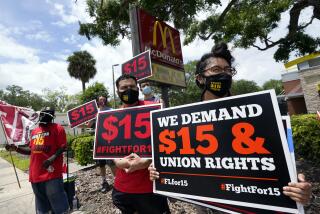Labor, Shareholders: A Mutuality of Interests
- Share via
The hard lesson of the 1980s for American workers is that they can no longer rely on corporate management to do the long-term planning necessary to keep U.S. corporations competitive in the international market.
The who’s-acquiring-whom atmosphere on Wall Street has shifted the business mind-set from long-term growth to immediate profit. Management’s energies are focused in the realm of corporate mergers, hostile takeovers, leveraged buyouts, junk-bond financing and defensive restructurings. Simultaneously, there has been a slackening in fixed capital investment, research and development, and interest in new products and markets that will be profitable over the long haul.
Rather than make the newly restructured companies more efficient, the new surge of financial maneuverings seems to have done little more than provide job security or golden parachutes for a handful of executives.
When management is inattentive to shaping an effective long-term corporate policy, labor can and should step in. Union members must generate their own standards of good management and create their own agenda for how their companies should be run. As most managers know, employees possess a great deal of knowledge about their company’s operations and problems. Yet it seems that the primary way workers are allowed to “contribute” to productivity changes is through give-backs and layoffs.
Unlike their Western European counterparts, American managers have traditionally shunned trade-union involvement in corporate policy planning. When shortsighted corporations resist such participation, labor should muster its organizing skills and build an alliance with the other major disenfranchised constituency inside today’s corporations--the shareholders.
Historically, both unions and shareholders have given management broad discretion to run companies. Yet many executives have abused their mandate to manage. They have created firms better suited to resisting takeovers than to producing and marketing quality products. Workers and shareholders have paid the price in lost jobs and underperforming stock.
Union/shareholder alliances are possible when both constituencies redefine their self-interest. Faced with corporate raiders bent on slashing jobs and closing plants, unions have tended to side uncritically with incumbent management. Labor’s true self-interest lies in judging each takeover on its own merits and deciding which management team would best represent the long-term interests of the corporation. In many instances, established executives need to be replaced and companies restructured before long-term profitability can be restored and new jobs created.
At the same time, the preoccupation of many shareholders with “quick buck” returns has conditioned management to go for short-term profits at the expense of long-term competitiveness. It is becoming abundantly clear, however, that the long-term performance of our equity markets depends on the structural health of our economy. Today’s shareholders need to develop strategies for achieving higher value by holding on to their shares, rather than bailing out of a stock when there is a disagreement with management. The challenge for investors is to remain in potentially troubled companies and fight to make management competitive and accountable.
Several public employee pension funds have demonstrated the broader view that shareholders must take if they are to play a significant role in shaping corporate policy. In the 1988 proxy season, these funds joined with several unions in filing and lobbying for more than 40 shareholder resolutions. These proposals challenged management on the issues of executive compensation, anti-takeover measures and shareholder democracy.
Pension plans represent the fastest- growing category of institutional shareholder and are expected to own approximately 50% of all corporate equity by the year 2000. Trustees of these funds have a great incentive to join labor in curbing corporate misconduct. Pension-fund contributor bases are directly affected by the ability of American corporations to create new jobs. The financial success of these funds rests not on making a “killing” in one or two takeover deals, but on the health of the American economy and the market as a whole. As long-term investors, pension fund and other large institutional investors have reason to see that companies make the necessary investments in products, ideas and people.
There is little doubt that increased union and shareholder involvement will be unwelcome by most corporate officials. But workers and shareholders must seek a higher level of participation in today’s corporations. Their enhanced activities will ensure a sound corporate policy--a policy that will protect jobs and maximize shareholder value.
More to Read
Inside the business of entertainment
The Wide Shot brings you news, analysis and insights on everything from streaming wars to production — and what it all means for the future.
You may occasionally receive promotional content from the Los Angeles Times.










